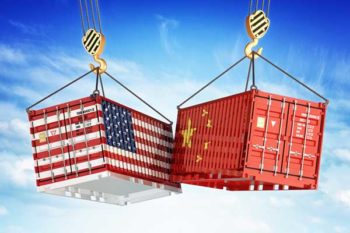
The Trade War with China
A major topic in many of our business discussions these days is the trade war with China. We have clients who compete with Chinese imports in the US market and are cheering on new trade restrictions, but we also have clients whose success depends on sales in China of products made in the US, which are for now priced out of the Chinese market. US producers of steel and aluminum are in a position of strength in the US market that few in the industry have been around long enough to have ever seen before. US manufacturers using those raw materials see only that their margins are under pressure, especially if their competitors are foreign and don’t face those cost pressures. All the uncertainty about the effects filtering through the whole economic system is only heightened by rumors of cease fire.
The world is a complicated place. To put an exclamation point on that, we only need to recognize that one of the largest Chinese exporters is Apple, while there are only two dominant US exporters of cars to China: BMW and Mercedes.
If identifying winners and losers causes such confusion, could we even make sense out of the trade war – its causes and possible end? To start, we would raise two important points:
- The position of the US government is that China has long waged a trade war against the US, with high tariffs, unfair competition from state-supported companies, onerous regulations, lack of IP protection, etc. And that position is valid. On the other hand, China has long argued that it’s a poor, developing country that should be cut considerable slack in policy, but that argument is quickly becoming outdated by their success, and the Chinese government acknowledges that.
- China sells roughly $500 billion a year of products to the US, while the US sells roughly a paltry $130 billion to China. US politicians and many US executives consider that imbalance unfair and an open invitation to a trade war which the US should be well-positioned to win. However, US shoppers at Wal-Mart and elsewhere see only a threat to the low prices they enjoy from China. Professional economists generally take the consumers’ side saying: “China is selling us billions in products at low prices. Why should we declare war?”
As the effects of new tariffs become apparent, there will be a lot of pain felt by the public in the US, balanced against some gains. In China, the pain of economic slowdown is already clear to the general public and the mood is negative. It would seem that both sides should want to settle before the damage becomes even more significant. Yet, even if both sides did want to settle, each could hold out for the other side to be more desperate—the US because public opinion matters so much, and China because it risks far more in exports than the US.
For the US, to settle would mean eliminating tariffs recently imposed. For China, settling would require being fair and allowing more competition from US products than Chinese companies have ever before faced, at home or abroad. While on the surface settling seems uncomplicated, it’s far from that, and it could be a long wait before we know what the future looks like.



